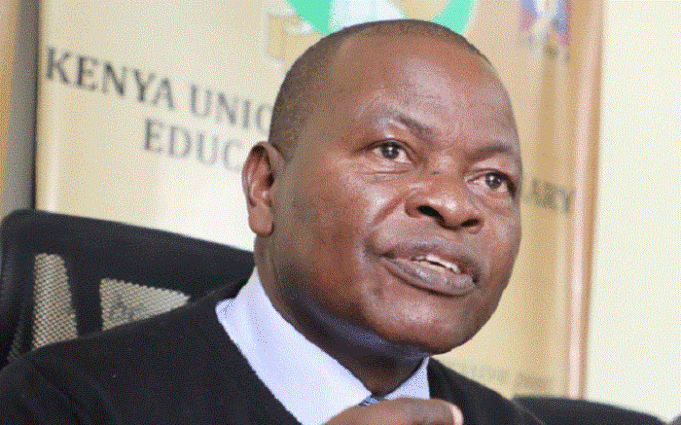KUPPET Denies Errant Branch Officials Salaries Over TPD Disagreement
Confusion mars Kenya Union of Post Primary Education Teachers (KUPPET) as a number of branch executive secretaries have decried the manner in which the national office has lumped together their salaries with union dues.
A number of branch officials said that the directive has made them go without their September and October salaries since the national office hasn’t given a clear directive on how they should pay themselves from the funds sent to the branches.
They argued that such a case has never been seen before since they are full time employees of the union.
They attributed this latest development as a way the national office intends to crack the whip on them for protesting against the controversial Teacher Professional Development (TPD) that was rolled out by the Teachers Service Commission (TSC) on September 22, 2021 at Centre for Mathematics,Science and Technology Education in Africa (CEMASTEA).
‘Previously, the head office directly channeled our salaries to our bank accounts. Now, we’re supposed to be paid from the dues sent through the branches, ‘they said.
Read also:
KUPPET Executive Secretaries’ Salaries Per County
KUPPET Vihiga Teams Up With 26 Other Branches To Reject TPD Modules
TSC Reinvites Teachers For A Tender Application
TSC County Directors, Deputy Transfers 2021
New Guidelines For Resumption of Games in Schools and Colleges
KUPPET Vihiga branch executive secretary Sabala Inyeni said his salary has been lumped together with union dues, a situation that has left the fate of executive secretaries in the hands of their junior branch officials who are signatories to the union accounts.
“We are union employees and asking us to pay ourselves from the union dues sent to the branches looks funny. We have third party obligations with financial institutions which we have to fulfill,” said Sabala.
Sabala maintained that it is KUPPET members who have rejected the controversial TPD modules.
“We will only support this program if our grievances are addressed. TSC should source for funding from the ministry to run this program and not ask members to cater for the cost of their retraining. We also expect them to design the programme in such a manner that senior colleagues don’t sit with junior colleagues for the same type of programmes. A teacher who has taught for many years and is headed for retirement in the next few years doesn’t require a module, if you ask me,” he added.
His sentiments were supported by his Migori counterpart Orwa Jasolo, who confirmed that he had gone without salaries for two months.
“We have not received salaries for two months now. I think the move is meant to intimidate and frustrate us on our stand on TPD which has not changed. It is the teachers of Migori who should change their stand not me, he added.
The directive affected about 8 executive secretaries including Moffats Okisai (Busia), Robert Miano (Laikipia), Shedrack Mutungi(Taita Taveta) and Moses Kimwere (Isiolo).
In October, the union’s deputy secretary general Moses Nthurima denied the claims that some officials hadn’t been said.
‘It is the responsibility of branches to pay secretaries since they are the ones that employ them. Our union’s constitution clearly statés who should pay branch secretaries. The national office has no role in it. The total dues from branch are reduced to pay a secretary, so nobody has gone without a salary.” He spoke.
Another issue causing tension among the union members is the issue of salary disparity among the executive secretaries.
The guidelines,signed by the union’s secretary general Akelo Misori on the Payment Of The Executive Secretaries Allowances And Branch Expenditure guidelines,which became effective on September 1 2021 stated that an executive secretary’s salary is pegged on the number of members in their branch.This implies that the fewer the members, the lower the salary and vice versa.
As per the guidelines, an executive secretary’s salary is derived using the formula: 152,000+58(x-700), where “x” is the total number of members in a branch while 152,000 is the standard amount applied to every secretary.
For instance, using this formula and the union membership as at May 2021, there is a huge pay disparity in the amount of money executive secretaries earn. The highest earns Shs 408,872 while the lowest earns Shs 127,872. (See the analysis as carried out by Education News in the table below. Members in Mandera are served directly by the Head Office).
This implies that executive secretaries in branches with few members are more disadvantaged in terms of salary and development of their branches since the branch dues and salaries are directly proportional to members.
The latest move to scrap off the salaries of 8 executive members has further complicated the situation. This is because with the standard amount of Shs 152,000 being scrapped off from the formula, only 58(x-700) is used to derive their salaries.
The guidelines further state that 20 percent of the balance of the branch dues should be used for office operations which include rent, office assistant, transport, stationaries among others, 60 percent should cater for monthly sitting allowances for union officials payable per cadre and 5 percent each for emergencies, capacity building including induction of newly recruited members, investment like land and buses among others, and co-curricular activities.




